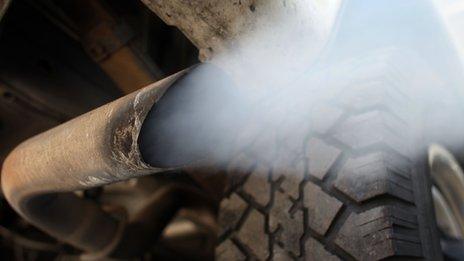UK air pollution fuels official concern
- Published
.jpg)
A small group of politicians could be spotted in Parliament Square last month struggling to squeeze wires and tubes into jacket pockets and handbags.
As traffic thundered around them, members of the Environmental Audit Committee (EAC) were being fitted with air pollution monitors.
At the flick of a switch, tubes attached to collars and lapels began to suck in the same air as the MPs, in tests that recorded their exposure to air pollution in Westminster and their constituencies.
Matthew Offord, member for Hendon, feared his suspicions about fumes from a high number of strategic roads in his constituency might be confirmed. The MP for Southampton Test, Alan Whitehead, was concerned that children might receive higher pollution doses than adults.
Mike Kane, member for Wythenshawe and Sale East, was keen to pinpoint local sources of pollution, explaining that "9% of my neighbours die early because of air pollution".
Stark mortality figures like these have convinced the EAC members to launch an investigation into the slow progress being made in improving air quality in the UK. The tests will feed into the investigation, with a report due to be published later this year.
'Diesel to blame'
Recent figures from Public Health England, the government health advisers, estimated that 29,000 deaths every year in the UK can be attributed to air pollution. Committee chair Joan Walley believes this is "a huge issue that is not being addressed".
"What we are dealing with now is invisible, therefore it is not high up in people's perceptions."
The investigation was carried out with the help of Benjamin Barratt, a lecturer in air quality science at King's College, London. To raise the profile of the issue and "show people pollution", he wants many more communities to have the chance to use his monitors.
The monitors measure the intake of black carbon, a product of combustion in vehicle engines, and combine it with data from a GPS watch that tracks the user's movements. Once he has analysed the figures, Dr Barratt produces a simple graph. A user can "relate the results so closely to their daily activity that it's almost as if they can see the pollution".
Whilst the levels of some air pollutants have declined significantly in the UK over the past 20 years, the levels of nitrogen oxides (NOx) and particulate matter (PM) have remained stubbornly high in most urban areas. Dr Barratt believes that diesel engines are "probably the root of the problem".
More cars are now sold with diesel engines than petrol, and efforts by the European Union to force manufacturers to produce cleaner diesel engines have met with limited success.
The official published figures appear to show new cars getting much cleaner, but drivers will find it tough to match those figures.
"Typically, we've found the real world NOx can be three, four, five times the official values," says Nick Molden, whose company, Emissions Analytics, measures the emissions of hundreds of cars in real traffic conditions every year.
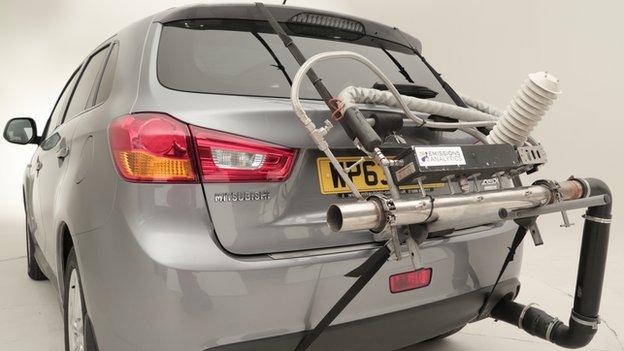
Monitors like this one are used to measure emissions
Whilst engines are tuned and run to minimise pollution in lab tests, he says that on the road, congestion and regular stopping and starting at junctions will produce very different figures.
EAC wants to study these kind of issues in its investigation, along with observations raised when the committee members received the results from their monitors.
Ms Walley, the MP for Stoke-On-Trent North, was concerned that "some of the highest figures were when I was driving around my constituency in my own car".
Mr Kane noted the sharp contrast between the high exposures he suffered travelling by car into Manchester, and the relatively low exposure experienced when taking the same journey by train.
Walking through the city, he was exposed to nearly three times as much pollution on busy Lever Street as he was walking alongside the nearby canal.
Dr Barrett points to a pollution peak suffered by the MPs when the committee members left Westminster and shared a taxi in rush hour traffic through central London. On a hot day, with the taxi windows open, the MPs' monitors recorded figures six times as high as those recorded walking in Parliament Square.
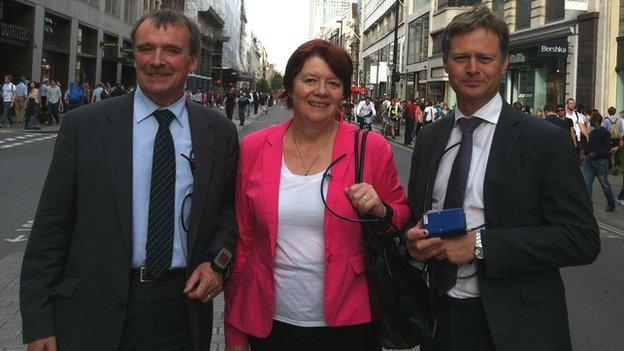
MPs Alan Whitehead, Joan Walley, Matthew Offord (l-r) took part in the tests
For Dr Barratt, knowledge is power. "In cities, we usually have choices. It's common sense. If you think the pollution is coming from vehicle exhausts, try to avoid them."
We should take the train rather than sit in our cars surrounded by other cars belching pollutants, he says - and then there is his personal bugbear.
"I see people jogging along busy roads. It's crazy. Jog through a park, jog through a back street. It's much more sensible, much more healthy."
Costing the Earth - The Diesel Decade is broadcast on BBC Radio Four at 15:30 on Tuesday and 21:00 on Wednesday - or catch up on the BBC iPlayer
- Published10 July 2014
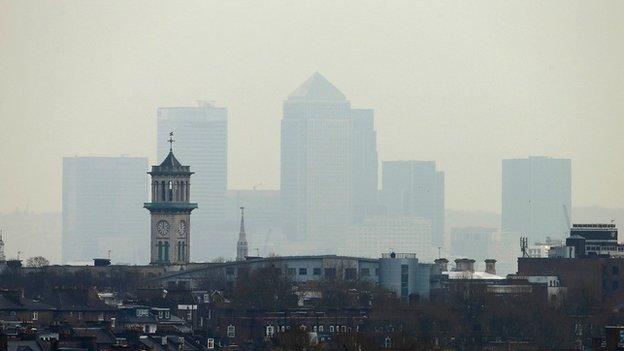
- Published29 July 2014
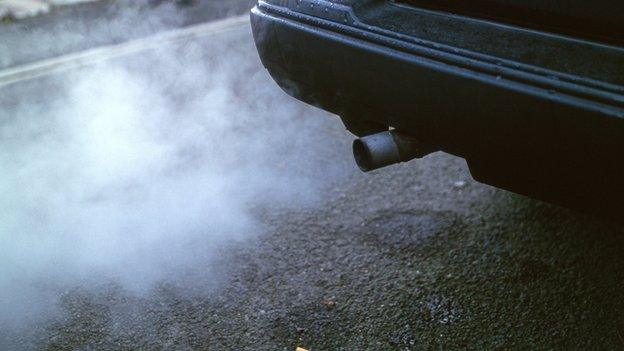
- Published4 April 2014
- Published20 February 2014
